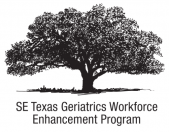No two adults age in exactly the same way, but we know that paying attention to the 4Ms (Matters Most, Medications, Mind, and Mobility) provide high-quality, age-friendly care for all older adults.
The Southeast Texas Geriatric Workforce Enhancement Program (SETxGWEP) is proud to offer the following educational activities to help older adults, their families and the wider community learn about the best care for aging adults.
Education from the SETxGWEP is developed through the financial support of the Health Resources Services Administration and is always available without cost.
Tools for Spotting Elder Mistreatment
Elder mistreatment is pervasive in our communities and increases older adult's risks for injury and poor health outcomes. This collection of videos is designed to provide training and resources to recognize and respond to common issues experienced by homebound older adults, including suspected cases of elder mistreatment. The training consists of 5 videos, each lasting 6 - 8 minutes, with information on:
Health Safety
The Health and Safety video reinforces the mantra “Always put safety first” and provides helpful tips on what to do when you encounter circumstances that just don’t seem to be “right".
Financial Exploitation
Financial abuse and exploitation is a growing national problem, with estimates that 50% of seniors have been victims of scams and exploitation. This presentation explains why seniors are targeted for financial exploitation, who the possible exploiters are, and some helpful tips on how to avoid them.
Hoarding
This video is a good introduction for individuals who have not yet encountered a case of hoarding. The video presents information on what hoarding is and isn’t, and discusses the accompanying mental health issues and self-neglect often seen among hoarders. It also draws an important distinction between clutter, collecting, and hoarding.
Late Life Depression
This video on late life depression discusses the multiple causes of depression and provides helpful tips on how to watch for changes, be good listeners, promote exercise, and ask about feelings.
Delirium
This video discusses delirium and the suddenness with which it can appear in a client, causing confusion, anxiety, and restlessness. The video also distinguishes delirium from dementia and some factors that could cause delirium. Tips on how to be alert for changes in behavior are provided.
Thank you for your interest in learning more about assisting vulnerable, aging adults. To help us improve our content and training programs, please take our survey and let us know what you think.
We appreciate your feedback!
Planning for the End of Life
The hard truth is that nobody lives forever. However, preparing for the end of life can make a difficult situation easier.
This collection of live workshops highlights the purpose and importance of planning for the end of life, including a review of advanced care planning documentation, the role of a surrogate decision-maker and how to pick one, as well as an introduction to palliative care.
If you have a group of caregivers or aging adults who would be interested to learn more, please click below to learn about presentation opportunities.
COVID-19 Vaccine Education
We all want the COVID-19 pandemic to end. Widespread vaccination offers our best chance to get back to a new normal.
Designed to address COVID-19 vaccine hesitancy, this 30-minute training answers frequently asked questions from older adults about available COVID-19 vaccines and how to sign up.Recognizing and Treating Dementia
Healthy aging requires attention to the mind. Changes in mood and memory can be symptoms of dementia, a collection of brain disorders that impair thinking, memory and communication. This learning activity is designed to improve understanding and awareness of dementia disorders, with a specific emphasis on concerns for LGBTQ elders.
If you have a group of caregivers or aging adults who would be interested to learn more, please click the button below to contact us.
Look in Your Mouth
Poor oral health and hygiene, especially among cognitively-impaired older adults, can have dramatic impacts on their overall health. This 10-minute video provides more information on how caregivers can help older adults to maintain good oral hygiene.
